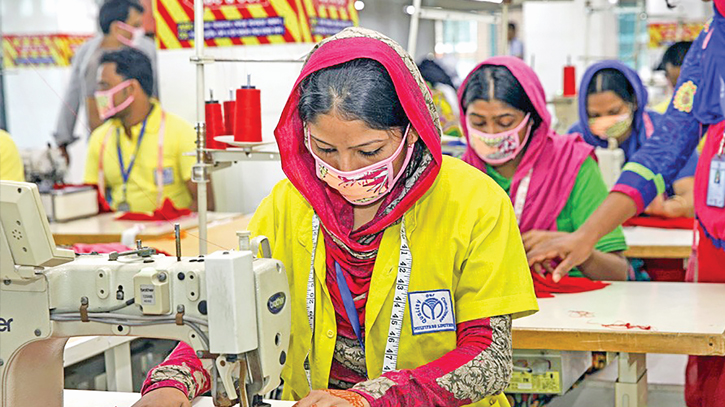
Photo: Messenger
The global economy has been grappling with a prolonged adverse situation caused by war since February 2022, and Bangladesh, a significant player in the readymade garment export industry, has felt the impact on its foreign currency earnings. The country is currently facing a dollar scarcity, which has led to various challenges.
Despite the challenges, there has been an unexpected increase in investment in the readymade garment sector. Over the past two years, approximately 600 factories and units have been established in the country. However, this growth has not been without setbacks, as some factories have closed due to reduced work orders, raising concerns about the overall health of the sector.
Key markets in the readymade garment sector have experienced a decline in exports, contributing to the challenges faced by Bangladesh. Additionally, new wage structures have been implemented in the sector, adding complexity to the current scenario.
According to the Bangladesh Garment Manufacturers and Exporters Association (BGMEA), the year 2023 saw 264 new factories making investments, a slight decrease from the 330 recorded in 2022. The data reveals that a total of 594 new factories have invested in the last two years, indicating continued interest in the sector despite the challenges.
The Export Promotion Bureau (EPB) data indicates a decline in apparel exports, with a value of $45.71 billion in 2022 compared to $47.39 billion in the previous year. This decrease can be attributed to various factors, including the impact of the global economic situation and reduced orders.
Though, several factories have been shut down recently. Businessmen say that many small factories are not able to survive as the cost is higher than the production. Due to dollar crisis,
LCs cannot be opened; banks are also unable to settle LCs.
Farooq Hasan, the President of the Garment Industry Owners` Association BGMEA, shared insights with the Daily Messenger, highlighting the impact of high inflation on global clothing purchases. He acknowledged the challenging condition of the world market, indicating that the reduction in clothing purchases is a widespread issue affecting all countries, including Bangladesh. However, he expressed optimism that this situation is likely temporary and emphasized the simultaneous increase in investments within Bangladesh. These investments are attributed to the establishment of environmentally friendly (green) factories, the adoption of modern technology, and the exploration of new markets for clothing.
Despite the positive developments, concerns arise due to declining exports in major markets, notably the United States and the European Union (EU). These regions constitute Bangladesh`s largest market for manufactured garments.
Data indicates a significant decline in apparel exports to the EU by 1.24 percent, the USA by 5.69 percent, and Canada by 4.16 percent during July-December of the 2023-2024 fiscal year. Specifically, exports to Germany, the EU`s largest export market, experienced a substantial 17.05 percent decrease, amounting to $2.86 billion in July-December 2023-24.
Meanwhile, apparel exports to Canada reached $741.94 million, reflecting a 4.16 percent decrease compared to the previous year.
Farooq Hasan attributed the crisis to inflationary pressure and acknowledged various measures taken by the United States, including the Federal Reserve raising policy interest rates. However, he expressed confidence that this situation would be temporary, and once normalcy is restored, the global clothing market will regain momentum.
Data from the Export Promotion Bureau (EPB) indicates that the Readymade Garment (RMG) sector fetched $23.39 billion, showing a growth of 1.72 percent in July-December 2024. Knitwear contributed $13.48 billion, while woven items earned $9.91 billion. In comparison, the previous year saw RMG exports at $22.99 billion, with knitwear at $12.65 billion and woven items at $10.33 billion.
The positive trend in garment exports to non-traditional markets is emerging as a promising development. The data reveals a steady increase of 12.28 percent in apparel exports to non-traditional markets, amounting to $4.53 billion during July-December of the fiscal year 2023-24. In comparison, the corresponding period of the previous fiscal year (2022-23) recorded exports at $4.04 billion.
Mohiuddin Rubel, the Additional Managing Director of Denim Expert Limited, highlighted the global struggle to control high inflation and the subsequent decline in exports to many major markets. However, he emphasized the positive aspect for Bangladesh`s readymade garment sector, stating that exports to new markets or non-traditional markets are on the rise.
Rubel provided specific figures, stating that in the first six months of the fiscal year, exports to Japan, Australia, and South Korea—key non-traditional markets for the country`s garment exports—have increased by 9.98 percent, 24.67 percent, and 19.06 percent, respectively. This diversification strategy appears to be yielding positive results for the readymade garment sector in Bangladesh.
Nevertheless, he acknowledged a decline in garment exports to India, citing a reduction of 17.27 percent.
Messenger/Disha








